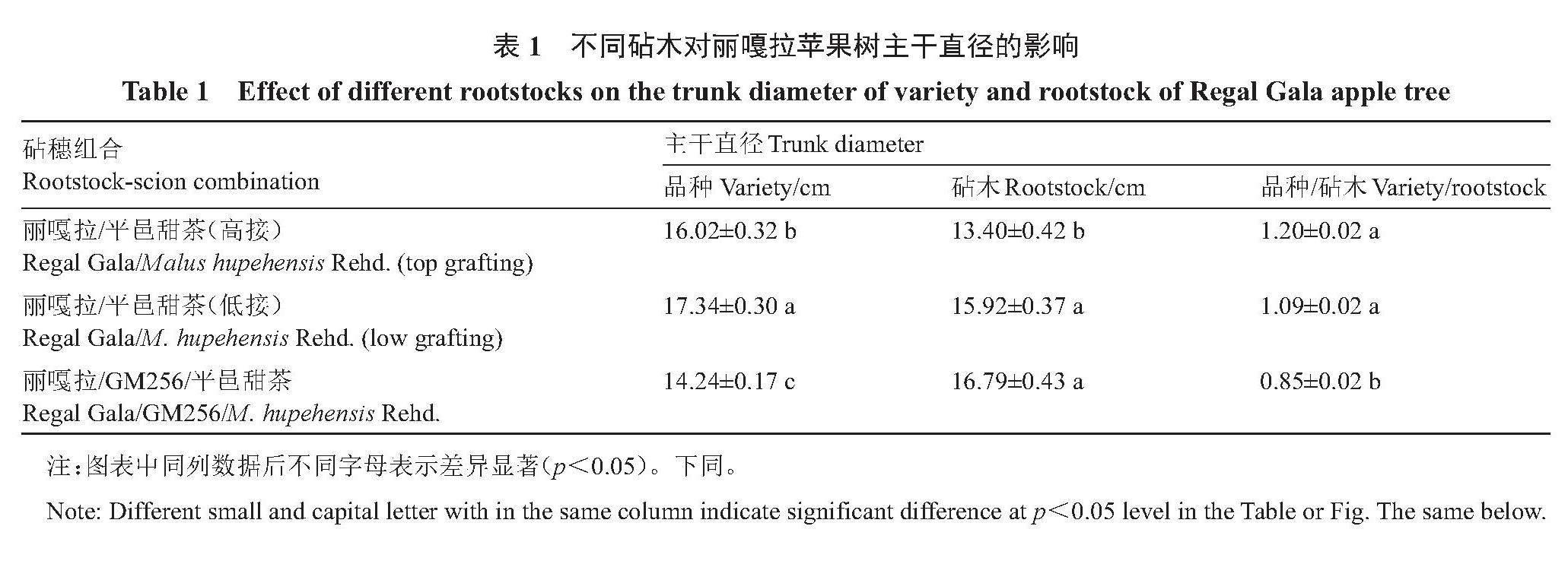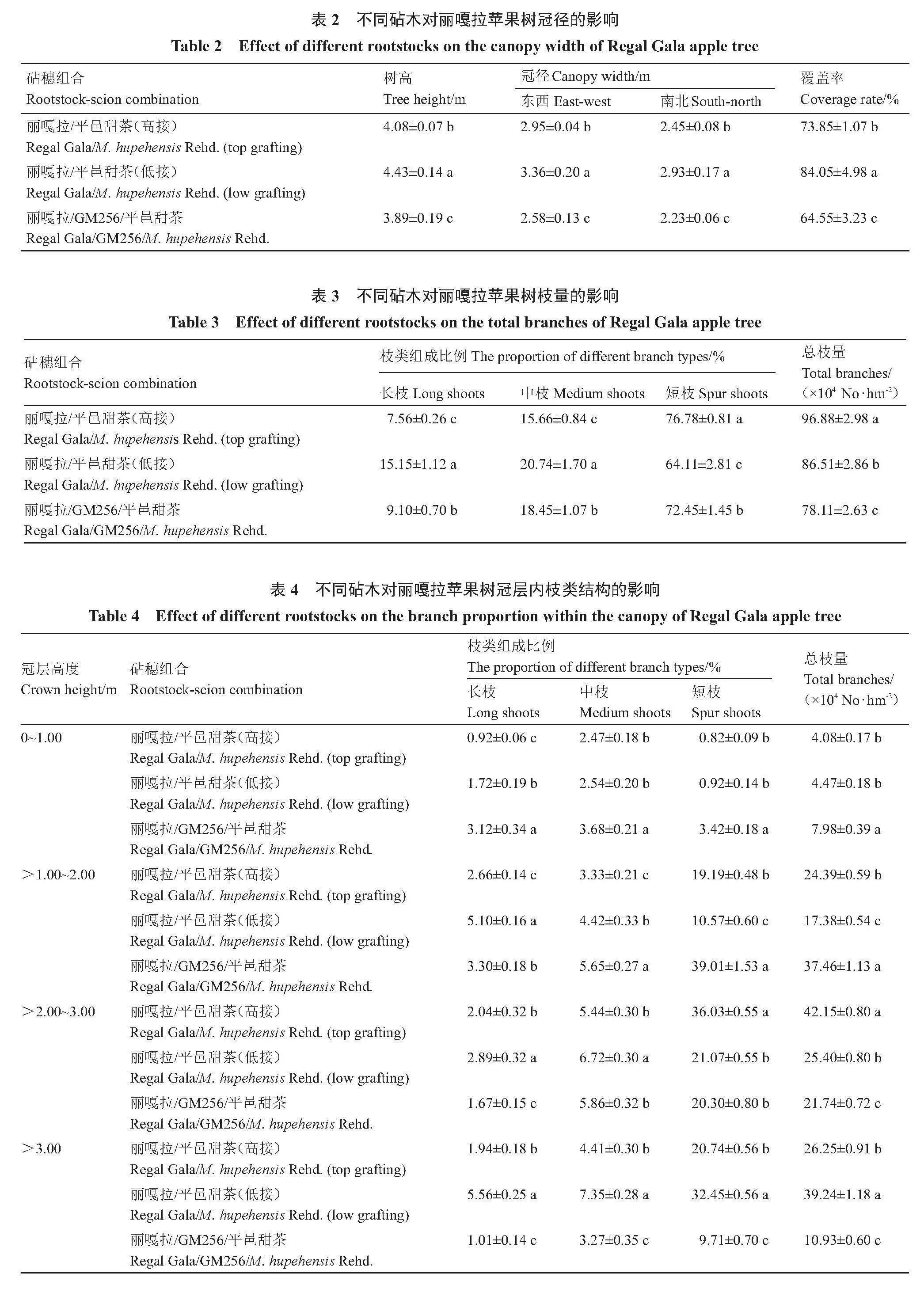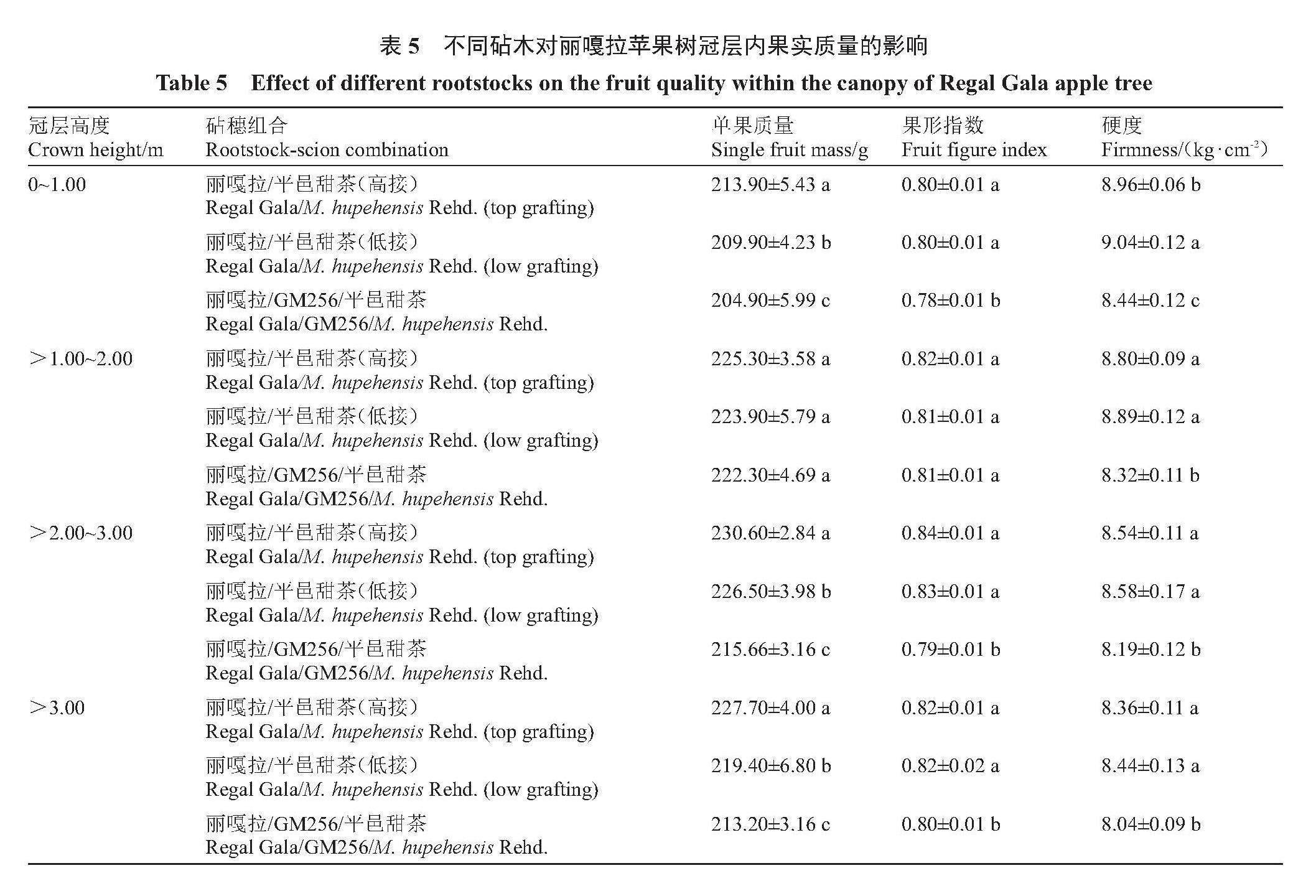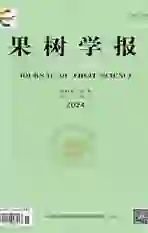平邑甜茶高位嫁接丽嘎拉苹果树冠层内枝类结构和果实品质、产量的分布
2024-06-15李宏建于年文宋哲张秀美里程辉韩丽红刘影周家旭
李宏建 于年文 宋哲 张秀美 里程辉 韩丽红 刘影 周家旭



DOI:10.13925/j.cnki.gsxb.20240040
摘 要:【目的】掌握以平邑甜茶为砧木,采用高位嫁接方式的丽嘎拉苹果树冠层内枝类结构、果实产量和品质的分布特点,为辽宁寒地苹果园建设中应用该种栽培模式,提升果品质量、优化栽培措施提供参考。【方法】以丽嘎拉/ GM256/平邑甜茶、丽嘎拉/平邑甜茶(高接)和丽嘎拉/平邑甜茶(低接)苹果树为试材,按照冠层分格的方法,将试验树从地面到顶部分成4个冠层,比较不同冠层高度内枝类结构、果实产量和品质的分布差异。【结果】丽嘎拉/平邑甜茶(高接)苹果树高、冠径、覆盖率生长速度高于丽嘎拉/GM256/平邑甜茶,丽嘎拉/平邑甜茶(高接)树体外观表现为“小脚”现象,而丽嘎拉/GM256/平邑甜茶表现为“大脚”现象。丽嘎拉/平邑甜茶(高接)苹果树枝量、短枝比例高于丽嘎拉/平邑甜茶(低接)和丽嘎拉/GM256/平邑甜茶。丽嘎拉/平邑甜茶(高接)、丽嘎拉/平邑甜茶(低接)和丽嘎拉/GM256/平邑甜茶枝量分布集中区域为冠层高度>2.00~3.00 m、>3.00 m和>1.00~2.00 m,占全树枝量比例的43.51%、45.37%和47.96%。相同冠层高度内,丽嘎拉/平邑甜茶(高接)果实单果质量、果形指数、硬度、可滴定酸含量、色差L和a值高于丽嘎拉/GM256/平邑甜茶。随着冠层高度的增加,丽嘎拉/平邑甜茶(高接)、丽嘎拉/平邑甜茶(低接)和丽嘎拉/GM256/平邑甜茶果实硬度、可滴定酸含量呈现下降趋势,而固酸比和色差值(L、a、b)呈现上升趋势。丽嘎拉/平邑甜茶(高接)和丽嘎拉/平邑甜茶(低接)果实产量主要分布在冠层高度>2.00 m的空间区域,占全树产量的69.79%和75.55%,而丽嘎拉/GM256/平邑甜茶为>1.00~3.00 m,占比全树产量的74.59%。【结论】以平邑甜茶为砧木,采用高位嫁接的丽嘎拉苹果树枝条数量多、短枝比例高、外观色泽好,树体枝量和果实产量分布集中区域为冠层高度>2.00~3.00 m,该冠层生产的苹果单果质量大、果形指数适中、可溶性固形物含量高。
关键词:苹果;枝类结构;品质;产量;树体冠层
中图分类号:S661.1 文献标志码:A 文章编号:1009-9980(2024)05-0887-10
收稿日期:2024-01-16 接受日期:2024-03-19
基金项目:营口市盖州苹果栽培管理科技特派团(2023JH1/0100007);现代农业产业技术体系建设专项资金(CARS-27)
作者简介:李宏建,男,副研究员,硕士,从事苹果栽培生理研究。E-mail:5lihongjian@163.com
果 树 学 报 2024,41(5): 887-896
Journal of Fruit Science
Distribution of branch composition, fruit quality and yield within the tree canopy of Regal Gala/Malus hupehensis Rehd. by top grafting
LI Hongjian, YU Nianwen, SONG Zhe, ZHANG Xiumei, LI Chenghui, HAN Lihong, LIU Ying, ZHOU Jiaxu
(Liaoning Institute of Pomology, Yingkou 115009, Liaoning, China)
Abstract: 【Objective】 The stock-scion combination of Regal Gala with rootstock of Malus hupehensis Rehd. served as the experimental samples, which were top grafted. The spatial distribution characteristics of branch composition, fruit yield and fruit quality were investigated in different canopy layers, so as to provide a reference for the technical optimization and improvement of fruit quality with this cultivation mode in cold regions of Liaoning province. 【Methods】 Three types of samples, including Regal Gala on the interstock of GM256 and rootstock of M. hupehensis Rehd., Regal Gala on the rootstock of M. hupehensis Rehd. (top grafting), and Regal Gala on the rootstock of M. hupehensis Rehd. (low grafting), were used as experimental materials. In 2020, the basic development status of the test trees was investigated, and indicators included trunk diameter of variety and rootstock, tree height, canopy width (east-west and south-north), coverage rate, etc. The experimental tree was divided into 4 layers according to the canopy height, and the number and proportion of branch types (long shoots, medium shoots and spurs) at different canopy heights were investigated. The differences in fruit yield and quality at different canopy heights among the tested materials were compared. Surveyed indicators included fruit mass, fruit shape index, firmness, soluble solids, titratable acidity, TSS/TA ratio, color difference value (L, a, b), etc. 【Results】 The growth rate of tree height, canopy width and coverage rate of Regal Gala on the rootstock of M. hupehensis Rehd. (top grafting) was higher than that of Regal Gala on the interstock of GM256 and rootstock on M. hupehensis Rehd.. There was difference in the growth rates between the rootstock of M. hupehensis Rehd. and the interstock of GM256. The results showed obvious differences in the variety/rootstock ratio of the apple tree. Regal Gala on the rootstock of M. hupehensis Rehd. (top grafting) showed a ‘small foot (The scion overgrows the stock), but a ‘big foot in Regal Gala on the interstock of GM256 and rootstock of M. hupehensis Rehd.. The number of branches and the proportion of spurs with Regal Gala on the rootstock of M. hupehensis Rehd. (top grafting) were higher than those of Regal Gala on the interstock of GM256 and rootstock of M. hupehensis Rehd., and Regal Gala on the rootstock of M. hupehensis Rehd. (low grafting). The numbers of branches of Regal Gala on the rootstock of M. hupehensis Rehd. (top grafting), Regal Gala on interstock of GM256 and rootstock of M. hupehensis Rehd., and Regal Gala on the rootstock of M. hupehensis Rehd. (low grafting) were 96.88 × 104 No.·hm-2, 78.11× 104 No.·hm-2 and 86.51 × 104 No.·hm-2, respectively. The branches of Regal Gala on the rootstock of M. hupehensis Rehd. (top grafting), or on the rootstock of M. hupehensis Rehd. (low grafting) were mainly distributed within a canopy height of 2.00 to 3.00 m or greater than 3.0 m, accounting for 43.51% and 45.37% of the total number of branches, respectively. The height from 1.00 to 2.00 m was the main distribution area of Regal Gala on the interstock of GM256 and rootstock of M. hupehensis Rehd., accounting for 47.96% of the total number of branches. There were differences in the spatial distribution of spurs within the tree crown between Regal Gala on the rootstock of M. hupehensis Rehd. (top grafting) and Regal Gala on the interstock of GM256 and rootstock of M. hupehensis Rehd.. The spurs of Regal Gala on the rootstock of M. hupehensis Rehd. (top grafting) were mainly distributed in the canopy height of more than 2.00 m, accounting for 56.77% of the total number of branches. The spurs of Regal Gala on the interstock of GM256 and rootstock of M. hupehensis Rehd. were mainly distributed in the canopy height of 1.00 to 3.00 m, accounting for 59.31% of the total number of branches. Fruit mass, fruit index, firmness, titratable acidity, L and a values of color difference with Regal Gala on the rootstock of M. hupehensis Rehd. (top grafting) were higher than those of Regal Gala on the interstock of GM256 and rootstock of M. hupehensis Rehd. within the same height of the canopy. The fruit quality within different canopy heights were compared, and it was found that the fruit firmness and titratable acidity of Regal Gala on the rootstock of M. hupehensis Rehd. (top grafting), the rootstock of M. hupehensis Rehd. (low grafting), or interstock of GM256 and rootstock of M. hupehensis Rehd. decreased with the increasing of canopy height, while TSS/TA value and L, a, b values of color difference showed an upward trend. At the canopy height from 2.00 to 3.00 m, the fruit mass, fruit index, and soluble solid content with Regal Gala on the rootstock of M. hupehensis Rehd. (top grafting) were the highest. Fruit mass and fruit index of Regal Gala on the interstock of GM256 and rootstock of M. hupehensis Rehd. were the highest at the canopy height of 1.00 to 2.00 m, soluble solid content was the highest at the canopy height of 2.00 to 3.00 m. Fruit mass of Regal Gala on the rootstock of M. hupehensis Rehd. (low grafting) was the highest when the canopy height was from 2.00 to 3.00 m, and soluble solid content was the highest at the canopy height of more than 3.00 m. There were significant differences in the distribution of fruit yield at different canopy heights. The fruit yield of Regal Gala on the rootstock of M. hupehensis Rehd. (top grafting) or (low grafting) were mainly concentrated in the spatial areas of more than 2.00 m, accounting for 69.79% and 75.55% of the total yield of the tree. The fruit yield of Regal Gala on the interstock of GM256 and rootstock of M. hupehensis Rehd. was concentrated from 1.00 to 3.00 m, accounting for 74.59% of the total production. Therefore, it can be seen that the concentrated distribution of fruit yield with Regal Gala on the rootstock of M. hupehensis Rehd. (top grafting) or (low grafting) were in the upper and middle parts of the tree canopy, while Regal Gala on the interstock of GM256 and rootstock of M. hupehensis Rehd. was in the middle part of the tree canopy. 【Conclusion】 Using M. hupehensis Rehd. as the rootstock and adopting top grafting method, the Regal Gala apple tree had larger coverage rate, more total branches, higher proportion of spurs, and better exterior fruit quality. The canopy height from 2.00 to 3.00 m was the concentrated area for the distribution of branches and fruit yield in the tree of Regal Gala on the rootstock of M. hupehensis Rehd. (top grafting). The characteristics of fruits produced in this canopy area were that fruit mass was higher, fruit index was better and soluble solids content was higher. The Regal Gala on the rootstock of M. hupehensis Rehd., in which top grafting was adopted was suitable for application and promotion in the apple orchards in cold regions of Liaoning province. They were not only easy to manage, but also conducive to increasing yield and income.
Key words: Apple; Branch composition; Quality; Fruit yield; Tree canopy
中国苹果栽培处于乔化稀植向矮化密植栽培模式的转变期,矮化密植是果园实现集约化、机械化、省力化管理作业的有效方式[1-4]。高纺锤树形因树冠高、光照好,果实产量高、品质好,已成为矮化密植果园建设中应用最广泛的新树形[5-6]。辽宁苹果栽培受到环境条件和气候因素的影响,矮化密植栽培发展速度较慢。辽宁冬季气候干旱、寒冷少雪,M9、M26、MM106等M系、MM系矮化自根砧木冻害现象频发,因此,辽宁苹果矮化栽培多采取中间砧栽培模式。GM256砧木因抗寒性好、早果性强,作为中间砧在辽宁苹果矮化栽培中广泛应用[7]。在苹果栽培生产中,盛果期GM256矮化中间砧的苹果树极易出现树体衰弱、结果部位外移,冠层内枝条、果实产量和品质分布不均衡等问题,严重影响树体结构稳定性和果园经济收益[8]。
树体冠层是果树生长发育过程中形成的树体骨架结构模式,冠层内的温度、光照、湿度等微气候环境复杂而多样,影响树体生长和果实发育[9]。合理的冠层结构是保持树体营养与生殖生长均衡,实现树体健壮与果品优质、果园高产稳产的有效手段[10-12]。前人研究发现,以平邑甜茶为砧木,采用高位嫁接方式的苹果树可以安全越冬[13]。参照矮化栽培模式管理,树体表现为干性强、树势中庸,早果性和丰产性好,该种栽培模式在辽宁寒地苹果栽培中已广泛应用[14-15]。砧木影响树体对光能、水分、肥料的利用效率,导致冠层内枝叶营养、果实产量、品质分布存在差异[16-18]。关于平邑甜茶高位嫁接栽培模式下的苹果树冠层内枝类结构和果实品质、产量的空间分布特点等研究未见报道。笔者在本研究中以高位嫁接方式的丽嘎拉/平邑甜茶(高接)苹果树为试材,以低位嫁接方式的乔化丽嘎拉/平邑甜茶(低接)和矮化中间砧丽嘎拉/GM256/平邑甜茶砧为对照,系统性评价高纺锤形丽嘎拉苹果树盛果期冠层内枝类、果实产量和品质的空间分布特点,为辽宁寒地矮化苹果栽培中采用平邑甜茶高位嫁接模式,提升果品质量和优化技术措施的应用提供理论依据。
1 材料和方法
试验在辽宁省果树科学研究所苹果试验区进行,试验区土壤为黏壤土,土壤有机质含量(w,后同)为1.33%,全氮含量为0.64%,速效磷含量为70.3 mg·kg-1,速效钾含量为107 mg·kg-1。果园采取行间自然生草,株间园艺地布覆盖,每666.7 m2施有机肥3500~4000 kg。
1.1 试验材料
试验设3个处理,供试苹果品种为丽嘎拉,砧穗组合分别为丽嘎拉/平邑甜茶(高接)、丽嘎拉/平邑甜茶(低接)和丽嘎拉/GM256/平邑甜茶。2011年春季栽植,丽嘎拉/平邑甜茶(高接)半成品苗木(利用3年生平邑甜茶作为基砧,将丽嘎拉接穗高位嫁接到平邑甜茶砧木距离地面60 cm处)、丽嘎拉/平邑甜茶(低接)成品苗木(平邑甜茶作为基砧,基砧长度为10 cm)和丽嘎拉/GM256/平邑甜茶成品苗木(平邑甜茶和GM256分别作为基砧和中间砧,基砧和中间砧长度分别为10 cm和30 cm)。栽植株行距为2.50 m×4.00 m,行向为南北方向,按照高纺锤树形培养,果园采取常规管理模式。
1.2 试验方法
试验选择生长势基本一致、无病虫害的试验树30株,2020年9月用钢卷尺分别测量树高、冠径(东西和南北方向),计算覆盖率/%=冠径(东西)/行距×100;利用游标卡尺测量品种和砧木嫁接口上部和下部5 cm处的主干直径。其中,丽嘎拉/GM256/平邑甜茶砧穗组合中砧木主干直径为测量GM256砧木的数值。按照冠层分格的方法,将试验树从地面到顶部分成4个冠层空间(0~1.00 m、>1.00~2.00 m、>2.00~3.00 m和>3.00 m),分别调查不同冠层内的长枝、中枝和短枝数量,统计树体总枝量和枝类比例。树体每个冠层内分别采摘50个果实,用于测定果实相关指标。果实单果质量、纵径和横径分别用天平和游标卡尺测量,计算果形指数;果实硬度、可溶性固形物含量和可滴定酸含量分别用GY-1型硬度计、DR-103型电子糖量仪和酸碱滴定法测定;果皮色差值采用色差计(Konica Minolta CR-400,USA)测定;测定树体不同冠层内果实产量,计算果实产量的空间分布比例[16]。
1.3 数据处理与分析
数据统计采用Excel软件,数据分析采用SPSS 13.0数据分析软件。
2 结果与分析
2.1 树体主干直径、树高和冠径的差异
不同砧木对丽嘎拉苹果树主干直径的影响如表1所示,丽嘎拉/平邑甜茶(高接)和丽嘎拉/平邑甜茶(低接)品种主干直径、品种/砧木比值高于丽嘎拉/GM256/平邑甜茶,丽嘎拉/平邑甜茶(高接)砧木主干直径低于丽嘎拉/平邑甜茶(低接)和丽嘎拉/GM256/平邑甜茶。在栽培生产中,丽嘎拉/平邑甜茶(高接)苹果树主干表现为轻微“小脚”现象,而丽嘎拉/GM256/平邑甜茶表现为“大脚”现象。
不同砧木对丽嘎拉苹果树冠径的影响见表2,丽嘎拉/平邑甜茶(低接)苹果树高显著高于其他处理。丽嘎拉/平邑甜茶(高接)苹果树冠径(东西和南北方向)大于丽嘎拉/GM256/平邑甜茶,丽嘎拉/平邑甜茶(低接)、丽嘎拉/平邑甜茶(高接)和丽嘎拉/GM256/平邑甜茶树冠覆盖率分别为84.05%、73.85%和64.55%。
2.2 树体冠层内枝类数量和比例的差异
不同砧木对丽嘎拉苹果树枝量的影响如表3所示,丽嘎拉/平邑甜茶(高接)苹果树总枝量最高,丽嘎拉/GM256/平邑甜茶最低。丽嘎拉/平邑甜茶(高接)短枝比例高于丽嘎拉/平邑甜茶(低接)和丽嘎拉/GM256/平邑甜茶,而长枝、中枝比例低于丽嘎拉/GM256/平邑甜茶。与丽嘎拉/GM256/平邑甜茶相比,丽嘎拉/平邑甜茶(高接)苹果树表现为总枝量大、短枝比例高,而丽嘎拉/平邑甜茶(低接)苹果树为短枝比例低,长枝和中枝比例高。
不同砧木对丽嘎拉苹果树冠层内枝类结构的影响如表4所示,不同冠层高度内,丽嘎拉/平邑甜茶(高接)枝量在冠层高度>2.00~3.00 m内的数量最多,为42.15×104条·hm-2,占全树枝量的43.51%;而丽嘎拉/平邑甜茶(低接)和丽嘎拉/GM256/平邑甜茶分别为>3.00 m和>1.00~2.00 m,枝量为39.24×104条·hm-2和37.56×104条·hm-2,占比为45.37%和47.96%。
比较不同冠层内枝类(长枝、中枝、短枝)分布比例,丽嘎拉/平邑甜茶(高接)长枝在冠层高度>1.00~2.00 m和>2.00~3.00 m内的比例高,占全树枝量的2.66%和2.04%;丽嘎拉/平邑甜茶(低接)为>1.00~2.00 m和>3.00 m,占比为5.10%和5.56%。丽嘎拉/平邑甜茶(高接)短枝在冠层高度>2.00~3.00 m和>3.00 m内的比例高,占全树枝量的36.03%和20.74%;丽嘎拉/平邑甜茶(低接)为>3.00 m和>2.00~3.00 m,占比为32.45%和21.07%;丽嘎拉/GM256/平邑甜茶为>1.00~2.00 m和>2.00~3.00 m,占比为39.01%和20.30%。表明丽嘎拉/平邑甜茶(高接)和丽嘎拉/平邑甜茶(低接)果实产量分布集中区域为树冠中、上层空间,丽嘎拉/GM256/平邑甜茶为树冠中、下层空间。
2.3 树体冠层内果实品质的差异
不同砧木对丽嘎拉苹果树冠层内果实质量的影响如表5所示,在不同冠层高度内,果实硬度随着冠层高度的增加呈现下降的变化趋势。丽嘎拉/平邑甜茶(高接)单果质量、果形指数在冠层高度>2.00~3.00 m内的数值最高,而丽嘎拉/平邑甜茶(低接)和丽嘎拉/GM256/平邑甜茶分别为>2.00~3.00 m和>1.00~2.00 m。在相同冠层高度内,丽嘎拉/平邑甜茶(高接)单果质量、果形指数、硬度高于丽嘎拉/GM256/平邑甜茶。
不同砧木对丽嘎拉苹果树冠层内果实品质的影响如表6所示,在不同冠层高度内,丽嘎拉/平邑甜茶(高接)和丽嘎拉/GM256/平邑甜茶冠层高度>2.00~3.00 m内的果实可溶性固形物含量最高,而丽嘎拉/平邑甜茶(低接)为冠层高度>3.00 m。随着冠层高度的增加,不同砧穗组合的丽嘎拉果实可滴定酸含量和固酸比分别呈现下降和上升的变化趋势。在相同冠层高度内,丽嘎拉/平邑甜茶(低接)果实固酸比最低,丽嘎拉/GM256/平邑甜茶高于丽嘎拉/平邑甜茶(高接)。
不同砧木对丽嘎拉苹果树冠层内果实色差值的影响如表7所示,随着冠层高度的增加,丽嘎拉果实色差L值、a值和b值呈现上升的变化趋势。在相同冠层高度内,丽嘎拉/平邑甜茶(高接)果实色差L值、a值高于丽嘎拉/平邑甜茶(低接)和丽嘎拉/GM256/平邑甜茶,b值低于丽嘎拉/平邑甜茶(低接)和丽嘎拉/GM256/平邑甜茶。
2.4 树体冠层内果实产量差异
不同砧木对丽嘎拉苹果树果实产量的影响如表8所示,丽嘎拉/平邑甜茶(高接)果实产量高于丽嘎拉/平邑甜茶(低接)和丽嘎拉/GM256/平邑甜茶。为了明确平邑甜茶高位嫁接丽嘎拉苹果树冠层内果实产量的分布特点,调查不同冠层高度内的果实产量分布和组成比例。
不同砧木对丽嘎拉苹果树冠层内果实产量的影响如表9所示,丽嘎拉/平邑甜茶(高接)果实产量在冠层高度>2.00~3.00 m内数值最高,占全树总产量的42.88%;丽嘎拉/平邑甜茶(低接)为>3.00 m和>2.00~3.00 m,占比为42.43%和33.12%,丽嘎拉/GM256/平邑甜茶为>1.00~2.00 m和>2.00~3.00 m,占比为46.44%和28.15%。
3 讨 论
辽宁冬季气候干旱,M系、MM系等矮化自根砧木无法安全越冬,GM256砧木因抗寒性强、早果性好,作为中间砧木在辽宁苹果矮化栽培中广泛应用。辽宁苹果栽培区域主要为山地、丘陵等土壤贫瘠地带,GM256中间砧木苹果树盛果期后,树体极易出现树势衰弱、干性差,冠层空间内枝叶和果实分布不均衡等现象。以平邑甜茶为砧木、采用传统低位嫁接方式的乔化苹果树,由于幼树期生长势旺、早果性差、树形培养周期长,因此果园管理成本居高不下。前期研究发现,利用平邑甜茶高位嫁接丽嘎拉,参照矮化模式管理的苹果树干性强、树势好,早果性和丰产性优于丽嘎拉/GM256/平邑甜茶[14]。以平邑甜茶作砧木,采用高位嫁接方法的建园模式在辽宁寒地苹果矮化园建设中已广泛应用,并取得良好的效果[13,15]。
苹果高纺锤树形因树形培养快、光照条件好、果实产量高,已成为国内外苹果集约栽培中广泛应用的高光效树形[5]。在本研究中,丽嘎拉/平邑甜茶(高接)高纺锤形苹果树枝量为96.88×104条·hm-2,而丽嘎拉/GM256/平邑甜茶和丽嘎拉/平邑甜茶(低接)分别为78.11×104条·hm-2和86.51×104条·hm-2。高登涛等[19]提出高纺锤形苹果树总枝量为8.1×105条·hm-2时,需要增加留枝量;而董建波[20]的研究认为枝芽量为9.0×105条·hm-2的矮砧密植苹果园可以实现优质丰产。丽嘎拉/平邑甜茶(高接)苹果树盛果期枝芽量已达到矮砧密植丰产园的标准。与丽嘎拉/平邑甜茶(低接)相比,丽嘎拉/平邑甜茶(高接)苹果树高、冠径、覆盖率低,树体间遮挡少、光照条件好,树势缓和,中枝、短枝的比例高。与丽嘎拉/GM256/平邑甜茶相比,丽嘎拉/平邑甜茶(高接)苹果树表现为干性强、枝量多、短枝比例高的特点,高比例的短枝为盛果期果园实现丰产、稳产提供了保障。
砧木影响树体抗性、养分分配和冠层结构,冠层结构与树体枝类、果实产量和品质形成密切相关[17-18]。在本研究中,丽嘎拉/平邑甜茶(高接)树体枝量分布主要区域为冠层高度>2.00~3.00 m,占全树枝量的43.51%,而丽嘎拉/GM256/平邑甜茶和丽嘎拉/平邑甜茶(低接)分别为>1.00~2.00 m和>3.00 m,占比为47.96%和45.37%。丽嘎拉/平邑甜茶(高接)苹果树干性好、冠径大,平邑甜茶高位嫁接后,树势生长受到抑制,树冠上部(冠层高度>2.00~3.00 m)养分分配均衡,成为枝条集中分布的空间区域。丽嘎拉/平邑甜茶(低接)苹果树势强,树冠上部空间光照条件好、养分竞争和分配数量多,枝条集中分布在冠层高度>3.00 m的空间区域。丽嘎拉/GM256/平邑甜茶苹果树干性弱、成枝力差、树冠上部枝条光秃现象明显,树冠中部(冠层高度>1.00~2.00 m)为树体枝条分布的集中区域。
树体冠层内枝条分布差异影响果实产量、品质的空间分布,丽嘎拉/平邑甜茶(高接)和丽嘎拉/平邑甜茶(低接)果实产量主要分布在冠层高度>2.00~3.00 m和>3.00 m的空间区域,而丽嘎拉/GM256/平邑甜茶为>1.00~3.00 m,分别占全树总产量的69.79%、75.54%和74.59%,树体果实产量与短枝数量分布集中区域具有一致性。丽嘎拉/平邑甜茶(低接)苹果树势强、树冠上部空间对养分的竞争更加明显,全树枝量和果实产量的45.37%和42.43%分布在冠层高度>3.00 m的空间区域。平邑甜茶高位嫁接后,缓和地上部树势生长,丽嘎拉/平邑甜茶(高接)苹果树冠中、上部空间营养和生殖生长趋于均衡,枝类结构合理、花芽质量好,冠层高度>2.00~3.00 m成为树体产量最高分布区域。由于GM256中间砧木对树势生长具有抑制性、矮化性作用,丽嘎拉/GM256/平邑甜茶树冠上部枝条成枝力差,树体冠幅小,枝量和产量主要集中分布在树冠的中、下部区域(冠层高度>1.00~2.00 m和>2.00~3.00 m)。
在栽培生产中,丽嘎拉/平邑甜茶(高接)苹果树枝叶繁茂、叶片光合效率高,果实生长速度快、单果质量和外观品质(L值、a值)优于丽嘎拉/GM256/平邑甜茶和丽嘎拉/平邑甜茶(低接)。冠层高度>2.00~3.00 m内丽嘎拉/平邑甜茶(高接)单果质量、可溶性固形物含量最高,而丽嘎拉/GM256/平邑甜茶单果质量在冠层高度>1.00~2.00 m内的数值最高,冠层高度>3.00 m内的丽嘎拉/平邑甜茶(低接)果实可溶性固形物含量最高,糖度优于其他冠层。冠层高度>2.00~3.00 m和>1.00~2.00 m分别为丽嘎拉/平邑甜茶(高接)和丽嘎拉/GM256/平邑甜茶树枝量分布主要区域,该冠层内枝叶数量大、光合效率高、碳水化合物的合成和积累多,果实生长速度快、品质好。
4 结 论
平邑甜茶砧木高位嫁接丽嘎拉与低位嫁接、GM256中间砧相比,具有树体枝量多、短枝比例高,外观品质好、果实产量高,冠层高度>2.00~3.00 m空间区域内枝量和产量占比大、果形指数高、单果质量大、可溶性固形物含量高等优点。在栽培生产中,可结合推广应用高位嫁接方式的丽嘎拉/平邑甜茶(高接)砧穗组合,方便管理,有利于增产增收。
参考文献References:
[1] 李丙智,韩明玉,张林森,雷小明. 我国矮砧苹果生产现状与发展缓慢的原因分析及建议[J]. 烟台果树,2010(2):1-4.
LI Bingzhi,HAN Mingyu,ZHANG Linsen,LEI Xiaoming. The suggestion and analysis of the causes of slow development on short anvil apple production in China present situation[J]. Yantai Fruits,2010(2):1-4.
[2] 韩明玉. 苹果矮砧集约高效栽培模式[J]. 果农之友,2009(9):12.
HAN Mingyu. Intensive apple orchard systems[J]. Fruit Growers Friend,2009(9):12.
[3] 王璇,刘军弟,邵砾群,闫振宇,韩明玉,霍学喜. 我国苹果产业年度发展状况及其趋势与建议[J]. 中国果树,2018(3):101-104.
WANG Xuan,LIU Jundi,SHAO Liqun,YAN Zhenyu,HAN Mingyu,HUO Xuexi. Annual development of apple industry in China and its trends and suggestions[J]. China Fruits,2018(3):101-104.
[4] 马宝焜,徐继忠,孙建设. 关于我国苹果矮砧密植栽培的思考[J]. 果树学报,2010,27(1):105-109.
MA Baokun,XU Jizhong,SUN Jianshe. Consideration for high density planting with dwarf rootstocks in apple in China[J]. Journal of Fruit Science,2010,27(1):105-109.
[5] 赵德英. 如何培养苹果高纺锤树形[J]. 果树实用技术与信息,2023(10):26.
ZHAO Deying. How to cultivate high spindle tree shape in apples[J]. Practical Techniques and Information for Fruit Trees,2023(10):26.
[6] 唐永辉,宋永良,王文. 苹果高纺锤树形整形存在的问题及对策[J]. 落叶果树,2020,52(4):66-67.
TANG Yonghui,SONG Yongliang,WANG Wen. The problems and counter measures of apple high spindle tree shaping[J]. Deciduous Fruits,2020,52(4):66-67.
[7] 黄金凤,闫忠业,王冬梅,吕天星,王颖达,刘志. 辽宁熊岳地区苹果树冻害调查分析[J]. 中国果树,2020(5):127-129.
HUANG Jinfeng,YAN Zhongye,WANG Dongmei,L? Tianxing,WANG Yingda,LIU Zhi. Investigation and analysis on freezing injury of apple trees in Xiongyue,Liaoning Province[J]. China Fruits,2020(5):127-129.
[8] 吕德国. ‘寒富苹果GM256矮化中间砧应用现状及对策分析[J]. 北方果树,2011(2):39-40.
L? Deguo. Application status and countermeasure analysis of Hanfu apple with GM256 dwarfing interstock[J]. Northern Fruits,2011(2):39-40.
[9] 张雲慧,李文胜,周文静,胡安鸿. 苹果分层纺锤形冠层结构与果实产量品质的关系[J]. 新疆农业科学,2018,55(7):1218-1226.
ZHANG Yunhui,LI Wensheng,ZHOU Wenjing,HU Anhong. Study on the relationship between apple layered spindle canopy structure and yield and quality[J]. Xinjiang Agricultural Sciences,2018,55(7):1218-1226.
[10] 马婧,汪有科,杨荣慧,南娟,李晓彬. 不同树形结构梨枣的冠层特性及节水性分析[J]. 干旱地区农业研究,2011,29(3):138-143.
MA Jing,WANG Youke,YANG Ronghui,NAN Juan,LI Xiaobin. Analysis on canopy characteristics and water saving of pear jujube in different training systems[J]. Agricultural Research in the Arid Areas,2011,29(3):138-143.
[11] BULER Z,MIKA A,TREDER W,CHLEBOWSKA D. Influence of new training systems of dwarf and semidwarf apple trees on yield,its quality and canopy illumination[J]. Acta Horticulturae,2001,557:253-260.
[12] GREEN S R,GREER D H,W?NSCHE J N,CASPARI H. Measurements of light interception and utilization in an apple orchard[J]. Acta Horticulturae,2001,557:369-376.
[13] 宋哲,王宏,刘志,于年文,张秀美,里程辉,李宏建,韩丽红. 平邑甜茶砧木高位嫁接苹果新品种直接建园探讨[J]. 江苏农业科学,2015,43(3):151-155.
SONG Zhe,WANG Hong,LIU Zhi,YU Nianwen,ZHANG Xiumei,LI Chenghui,LI Hongjian,HAN Lihong. Discussion on the direct establishment of Malus hupehensis Rehd. rootstock high grafting apple varieties[J]. Jiangsu Agricultural Sciences,2015,43(3):151-155.
[14] 李宏建,王宏,于年文,宋哲,里程辉,张秀美,韩丽红. 平邑甜茶高位嫁接丽嘎拉苹果树体结构和果实产量的形成特点[J]. 果树学报,2023,40(7):1363-1373.
LI Hongjian,WANG Hong,YU Nianwen,SONG Zhe,LI Chenghui,ZHANG Xiumei,HAN Lihong. Formation characteristics of tree structure and fruit quality in Regal Gala apple on Malus hupehensis Rehd. with top grafting[J]. Journal of Fruit Science,2023,40(7):1363-1373.
[15] 孙长乾. 平邑甜茶高接‘宫崎短枝红富士苹果的密植栽培技术[J]. 北方果树,2022(3):26-28.
SUN Changqian. Dense planting technique of Malus hupehensis Rehd. grafted with ‘Fuji apple[J].Northern Fruits,2022(3):26-28.
[16] 李宏建,王宏,刘志,于年文,宋哲,张秀美,里程辉. ‘岳阳红/‘77-34/山定子砧穗组合的苹果树体结构、果实产量和品质形成特点[J]. 果树学报,2019,36(1):56-66.
LI Hongjian,WANG Hong,LIU Zhi,YU Nianwen,SONG Zhe,ZHANG Xiumei,LI Chenghui. Formation characteristics of tree structure,fruit yield and quality in the apple stock-scion combination of ‘Yue Yanghong with ‘77-34 interstock and Malus baccata Borkh. rootstock[J]. Journal of Fruit Science,2019,36(1):56-66.
[17] 李民吉,张强,李兴亮,周贝贝,杨雨璋,周佳,张军科,魏钦平. SH系矮化中间砧对‘富士苹果树体生长、产量和果实品质的影响[J]. 园艺学报,2018,45(10):1999-2007.
LI Minji,ZHANG Qiang,LI Xingliang,ZHOU Beibei,YANG Yuzhang,ZHOU Jia,ZHANG Junke,WEI Qinping. Effects of five different dwarfing interstocks of SH on growth,light distribution,yield and fruit quality in ‘Fuji Apple trees[J]. Acta Horticulturae Sinica,2018,45(10):1999-2007.
[18] 兖攀,王久照,姜继元,陈奇凌. 南疆3种砧木苹果树的光能截获率及冠层结构优化[J]. 西南农业学报,2022,35(11):2616-2626.
YAN Pan,WANG Jiuzhao,JIANG Jiyuan,CHEN Qiling. Light interception rate and canopy structure optimization of apple trees with three kinds of stocks in southern Xinjiang[J]. Southwest China Journal of Agricultural Sciences,2022,35(11):2616-2626.
[19] 高登涛,郭景南,魏志峰,范庆锦,杨朝选. 中部地区两类矮砧密植苹果园生产效率及光照质量评价[J]. 中国农业科学,2012,45(5):909-916.
GAO Dengtao,GUO Jingnan,WEI Zhifeng,FAN Qingjin,YANG Chaoxuan. Evaluation of productivity and light quality in two high density dwarf rootstock apple orchards in central China[J]. Scientia Agricultura Sinica,2012,45(5):909-916.
[20] 董建波. 苹果矮砧密植园个体与群体参数研究[D]. 保定:河北农业大学,2010.
DONG Jianbo. Research on individual and group parameters of apple orchard with intensive planting on dwarf rootstock[D]. Baoding:Hebei Agricultural University,2010.
